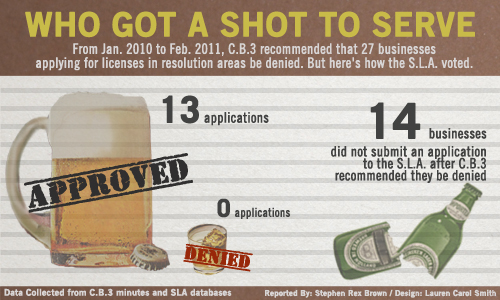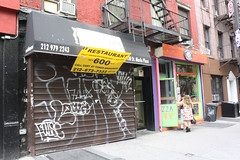 Sarah Darville The vacant space at 130 St. Marks Place.
Sarah Darville The vacant space at 130 St. Marks Place.Talk about no rest for the weary. While most Community Board 3 committees are taking the month off, the SLA and DCA Licensing committee will meet on August 20 to consider 45 different businesses seeking approval for new or modified licenses to sell alcohol.
Some of the highlights include a liquor license renewal of UCB East, which has a complaint history, according to the board. The new owners of Lakeside Lounge — soon to be Blackburn — are scheduled to appear before the committee, as expected.
A new business is bound for 130 St. Marks Place; an employee at Whole Earth Bakery next-door told The Local that rumor has it that it will be a sushi joint. (Take this with a grain of salt, Sushi Lounge is only a few doors away at Avenue A). The space had been vacant for close to a year.
And as usual, Nevada Smiths is once again scheduled to appear for approval of a full liquor license. The new location of the soccer bar has appeared on the agenda for months, only to be scratched at the last minute. Here’s the rest of what’s on tap for the Aug. 20 meeting. Read more…
 Daniel Maurer Zaragoza.
Daniel Maurer Zaragoza.Zaragoza’s nearly year-long quest for a beer and wine license is entering the final stretch.
Ruben Martinez, one of the deli’s owners, confirmed that the family-owned business will soon go before the State Liquor Authority after filing missing paperwork with Community Board 3.
“It was my fault. I had other things on my mind and I didn’t sign it off,” Mr. Martinez said of the documents that agreed to a series of community board stipulations. “It was just dropped off a week later and it wasn’t on time.”
For Zaragoza, the dry spell began last July when its alcohol license expired. The family failed to renew it and, a month later, they were charged for selling beer with an expired license. (It didn’t help that they sold the alcohol to a minor, either).
Read more…
 Edna Ishayik
Edna IshayikCommunity Board 3 may have set a record last night: with 27 items on the agenda – including Ninth Street Espresso’s bid to serve beer, a pitch for a German beer hall on the Bowery, and a Starbucks location’s attempt to win back its sidewalk seats – the board’s State Liquor Authority committee meeting ran past 2 a.m.
The main event: the owners of B-Side are hoping to open a spot at East Broadway and Clinton Street that would be “totally different” than the punk bar on Avenue B and would include a chip shop purveying “the best fish, chips and falafel you’ve ever had,” according to owner Sivan Harlap.
In an e-mail, Ms. Harlap called the new venture a “grown-up version of B-side,” explaining that “there are things I am interested in now that I wasn’t that all interested in when I was 22 – craft beers, cocktails, thoughtful food, this new place will reflect those new interests.”
Speakers lined up to argue in favor and against the new watering hole that would be catty-corner to the Seward Park Cooperative. Some neighbors said they looked forward to having a place to grab a drink or a bite in an area that isn’t laden with bars and restaurants. But opponents, some of whom were concerned about loud noise, had collected over 600 signatures, partially through churches and schools nearby. Read more…
 Daniel Maurer
Daniel MaurerCommunity Board 3 just released its new agenda that, as always, is chock full of tantalizing tidbits regarding new restaurants and bars bound for the neighborhood. A few highlights from the State Liquor Authority licensing committee: a new “Empanadas Bar” is seeking a beer and wine license in the space formerly occupied by Itzocan Cafe on East Ninth Street. Shervin’s Cafe on East Seventh Street near Avenue A will also seek the board’s approval for beer and wine, though its Facebook page is already advertising new summer cervezas.
One of the neighborhood’s most frequented bars, the 13th Step, will seek approval for a renewal of its liquor license. On several occasions at least two neighbors of the popular bar have pleaded with officers at the Ninth Precinct Community Council meeting to do something about the boisterous behavior of its customers. Read more…
Late last month, Community Board 3 left supporters of Heathers stunned by voting nearly unanimously to recommend a denial of the bar’s liquor license renewal. But was the whole process a waste of time? Two weeks later, the State Liquor Authority — the true arbiter of the fate of businesses that sell booze — renewed the bar’s license with little fanfare, raising doubts about whether it had heeded the board at all.
Just how much stock does the S.L.A put in the community board’s recommendations, anyway? For all the blogosphere’s feverish coverage of dramatic and often-controversial community board rulings, the question is rarely addressed. To answer it, The Local combed through a year’s worth of liquor authority license applications going up to Feb. 2011 (we ignored applications after that date, since many of them are still under review). In that year, we found that the State Liquor Authority consistently granted licenses to bars and restaurants that Community Board 3 had recommended for denial.
Read more…
Community Board 3 tonight approved the creation of two historic districts in the East Village, paving the way for official consideration by the city. The proposal was divided into two separate motions with a 23 to 9 vote in favor of the Second Avenue district and unanimous support for the Tenth Street district. Preservationists reiterated that the measures were the only way to protect the neighborhood from what they consider excessive development while opponents from the religious community, some of whom walked out of the meeting in protest, countered that they could not bear the financial burden of renovations under the landmarking requirements.
—Laura E. Lee and Stephen Rex Brown
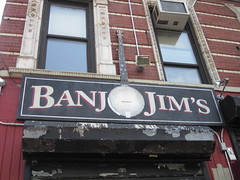 Meghan Keneally The transfer was approved for Banjo Jim’s.
Meghan Keneally The transfer was approved for Banjo Jim’s.The State Liquor Authority Committee of Community Board 3 Monday night endorsed the transfer of the liquor license at Banjo Jim’s, the popular bluegrass bar on Avenue C.
The transfer of the bar’s liquor license was said to be the only issue left to be resolved before the bar was sold to an ownership group led by Robert Ceraso. The next step is for the Community Board to pass along its recommendation to the State Liquor Authority.
The new license allows for acoustic guitar accompanied by microphone amplification and DJs up to two times per week. The hours will remain the same as they are at Banjo Jim’s currently — 5 p.m. to 4 a.m. throughout the week, and then from noon until 4 a.m. on the weekends. Few other details were finalized at Monday’s meeting, except that the signage will change — perhaps unsurprising since Mr. Ceraso has indicated that he will depart from the bluegrass theme and opt for an “artisanal” motif, which may not fit with the large banjo on the current sign over the bar’s front door. The bar’s new doors will be barn-style with glass windows that can be lifted and opened in the summer months.
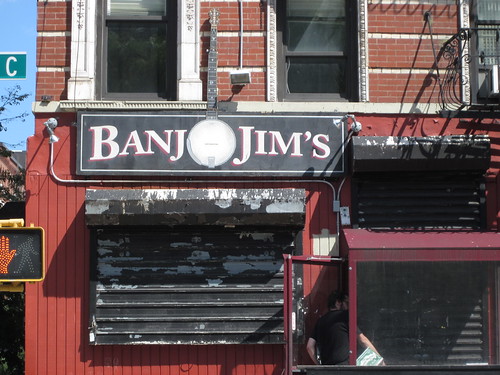 Meghan Keneally. A staple of the East Village music scene, the future of Banjo Jim’s is up for approval.
Meghan Keneally. A staple of the East Village music scene, the future of Banjo Jim’s is up for approval.After the blogger EV Grieve reported that changes may be coming to Banjo Jim’s, a popular bluegrass bar on Avenue C, locals took to their keyboards and headed to the blog’s comments section in anguish.
The bar’s prospective owner, Robert Ceraso, told the blog that he will be presenting a plan to the State Liquor Authority Committee of Community Board 3 tonight asking that the liquor license for the bar be tranferred to he and his partners. In describing his vision for his bar, Mr. Ceraso said that he envisioned it as an “artisanal neighborhood cocktail bar.” And that did him in.
Commenters skewered his use of the word, likening it to buzzwords of trends past, and immediately branded him as one of the big bad developers swooping in to discard the East Village of old.
One commenter, Chris Flash, wrote: “Yet another cool unpretentious music venue lost on the LES, to be replaced by yet ANOTHER yuppie dive, as if Ceraso’s dive will be different from any other dive!!”
Another, Bowery Boogie, said: “Missing Banjo Jim’s already. Artisinal is one of those buzz words that makes me puke every time.”
Mr. Ceraso said that the reaction was not totally unexpected.
“I knew there was going to be some backlash,” Mr. Ceraso said in a telephone interview. “People don’t like change and they turned me into some crazy guy that wants to change the neighborhood.”
Read more…
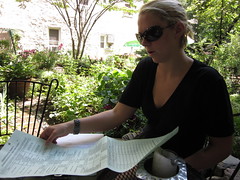 Meghan Keneally. Natasha Dillon.
Meghan Keneally. Natasha Dillon.It hasn’t exactly been a banner year for New York politicians: the names Weiner and Kruger have recently been added to the list of elected officials who are associated with scandal.
But the roster of players on the state’s political scene is constantly replenishing, and this summer, a handful of aspiring East Village pols are among 90 Manhattanites running for positions at one of the lowest levels of the state’s political hierarchy, the New York County Democratic Committee.
You could be forgiven if you hadn’t heard of the county committee before — its workings are one of the more arcane aspects of state politics. County committees meet roughly once a year and one of their most significant roles is to step in during times of unexpected transition to choose nominees for special elections, such as the Sept. 13 contest to fill Mr. Weiner’s seat.
Natasha Dillon, 26, is one of local candidates running for a seat on the committee. Ms. Dillon has a growing familiarity with the city’s political scene — she recently became a member of Community Board 3 and has long been an activist in the gay and lesbian community — but she wasn’t completely aware of the role of the county committee.
“I know they have some sort of say in nominations of Democratic candidates of special elections, like the Queens County Committee is meeting about Weiner,” she said one recent afternoon before she headed out to petition for the required signatures in order to get her name on the ballot. “It’s a very small commitment.”
Read more…
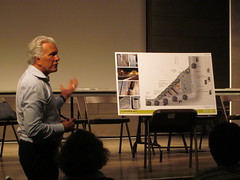 Meghan Keneally Thomas Balsley at Monday’s meeting.
Meghan Keneally Thomas Balsley at Monday’s meeting.Members of Community Board 3 voted unanimously Monday night to oppose plans for an outdoor plaza at the new 51 Astor Place because of questions about whether the design provides enough space for the public and fits aesthetically with the surrounding neighborhood.
The board’s Planning and Land Use committee said that it will not endorse the plaza project unless changes are made that take into account the historic nature of the area around 51 Astor and other design issues, including the placement of benches.
Work is set to begin in the next few days, and the construction of the mixed-use commercial tower is set to last for 17 months.
After listening to a presentation by Thomas Balsley, the designer in charge of planning the outdoor space that will accompany the new building on Astor Place, members of the public were given a chance to address the board.
Speakers, many of whom were opposed to the design, raised a range of issues about the project from its look and aesthetics to what some said was its failure to account for the historic nature of the district.
“It’s like it’s from some other city,” said Marilyn Appleberg, who was a part of the group that discussed the initial plans for the building when they were approved in 2002. “I was really disappointed.”
A final discussion on the plaza project will occur at the full community board meeting on July 26.
The liquor license application for a new music venue at 34 Avenue A was denied by a Community Board 3 vote tonight. Tensions ran high as board members heard from the public on both sides of the issue, which was referred to the full board by the licensing committee. The 28-7 vote puts the future of the proposed site, a project by music curator Todd Patrick and longtime East Village proprietor Phil Hartman, on hold. — Laura E. Lee
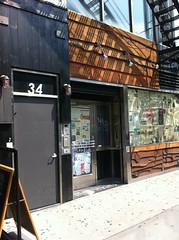 Todd Olmstead The doorway of 34 Avenue A.
Todd Olmstead The doorway of 34 Avenue A.I felt very young last week, sitting at the Community Board 3 meeting at 200 East Fifth Street. Being 21 years old, there were surely other attendees my age, or younger. But I could not beat the feeling that our voices and spirits were being silenced. I say this mostly because, as the Community Board again refused to support the application for a new experimental music venue at 34 Avenue A (formerly Mo Pitkins), a project of the music promoter Todd Patrick and Two Boots owner Phil Hartman, I felt like one of the few attendees who genuinely understood the cultural significance of what their proposed space, The Piney Woods, could be.
Imagine my surprise yesterday afternoon, when, flicking through Gmail on my iPhone, I found a response from Richard Hell, musician, punk innovator, East Village resident,and one of the most influential musical figures to come out of the neighborhood, in support of the application. The board is scheduled to consider it again at its meeting tonight.
“The Lower East Side needs a specialized, non-pop music room for musicians who are in it for other things than head-banging or making it big,” Mr. Hell told me. “Headbanging and raw ambition are fine, but there are plenty of venues for that already, and the Lower East Side would do well to maintain or recover its tradition of cutting edge art.”
Read more…






